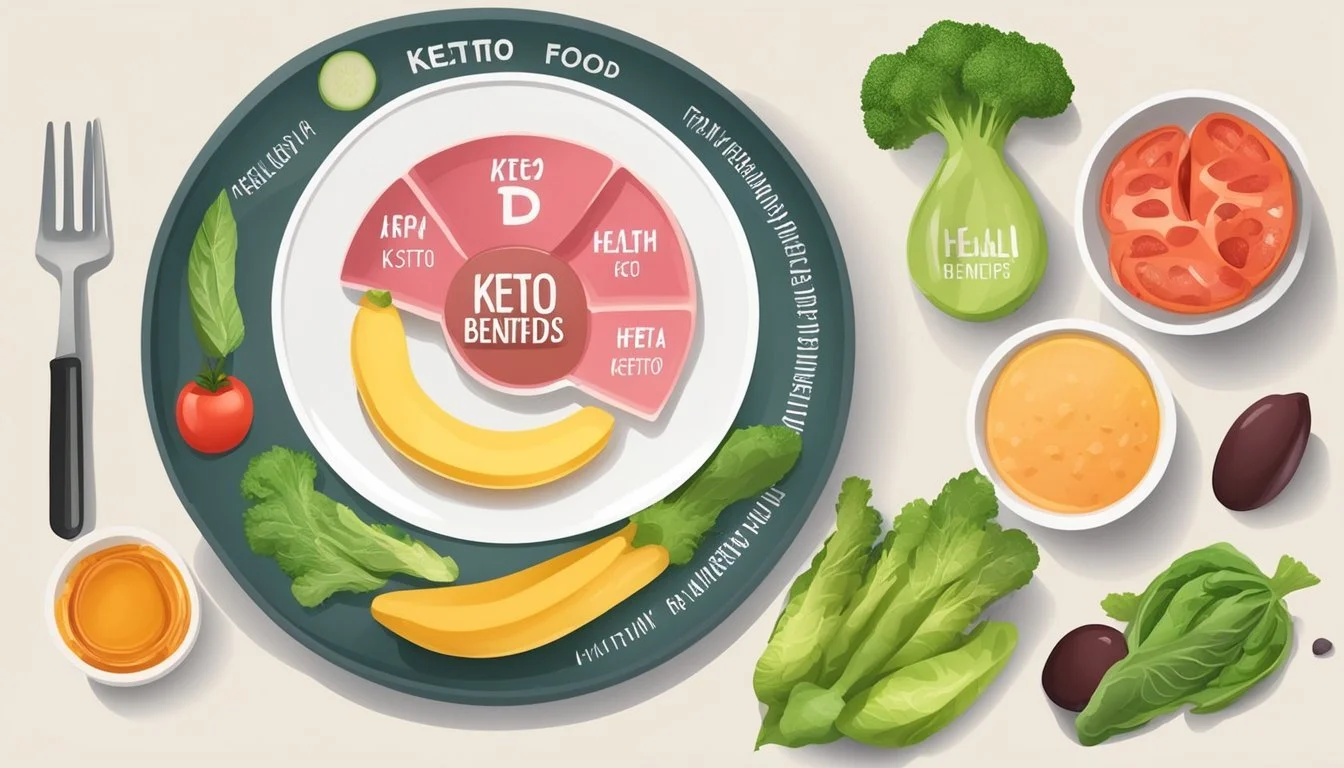Keto Diet and Blood Type
Uncovering the Relationship for Personalized Nutrition
The ketogenic, or keto, diet is a high-fat, low-carbohydrate eating plan that has gained popularity for its potential benefits such as weight loss, improved insulin sensitivity, and increased mental clarity. By drastically reducing carbohydrate intake and replacing it with fat, the body enters a metabolic state called ketosis, where it becomes more efficient at burning fat for energy. While traditionally not taking individual characteristics such as blood type into account, the keto diet's emphasis on macronutrient ratios remains its core principle.
Blood type diets, on the other hand, suggest that one's dietary needs can be tailored according to their blood group. This concept, popularized by Dr. Peter D'Adamo, purports that each blood type—O, A, B, and AB—has its own unique dietary patterns that can optimize health and decrease disease risk. However, the integration of keto principles with blood type diets proposes a hybrid approach, arguing that individuals may see further benefits by aligning their macronutrient intake—high in fats and low in carbs—with their blood type-specific foods.
The intersection of the keto diet with the concept of blood type dietary adjustments is a subject of emerging interest. Advocates of combining these dietary approaches suggest that it could lead to personalized nutrition strategies, providing a new dimension to traditional keto by considering the individual’s blood type. Although scientific evidence supporting blood type diets is limited, personalized nutrition continues to be an area of investigation in the context of dietary interventions, including the ketogenic diet.
Understanding the Keto Diet
The Keto diet revolves around high-fat, low-carbohydrate eating habits that shift the body's primary fuel source from glucose to ketones.
Core Principles of Ketogenic Eating
The ketogenic diet is characterized by a significant reduction in carbohydrate intake, instead emphasizing the consumption of fats. This restriction of carbs usually means limiting them to 20 to 50 grams per day, depending on the individual's metabolism and dietary goals. The diet's macronutrient ratio often falls around 70-80% fats, 10-20% protein, and 5-10% carbohydrates.
Ketosis and Its Metabolic Effects
Ketosis is a metabolic state in which the body starts burning fats for energy instead of carbohydrates as a result of the low carb intake. When the body is in ketosis, the liver breaks down fats into molecules called ketones, which can be used as an efficient energy source. Achieving this state typically requires several days of strict adherence to the keto diet.
Benefits of Keto for Weight Loss and Energy
Many individuals pursue a ketogenic diet for weight loss and increased energy. By reducing carbohydrate intake, the body is forced to deplete its glucose reserves and start burning fats, often resulting in weight loss. Furthermore, because ketones are an easily accessible energy source for the brain and body, many people report heightened mental clarity and sustained energy levels throughout the day.
The Role of Blood Type in Diet
Different blood types may have unique nutritional needs according to the Blood Type Diet. Here's an exploration into how one's blood type might guide their dietary choices.
Blood Type Diet Overview
The Blood Type Diet, popularized by Dr. Peter D'Adamo, suggests that an individual's blood type can determine the most suitable diet for their body. This diet posits that certain foods may be beneficial or detrimental depending on the person's blood type. Dr. D'Adamo's research classifies diets into categories that align with the needs of each blood type.
Typical Foods for Each Blood Type
The Blood Type Diet theorizes that each blood type should focus on specific food groups.
Type O: Known as the oldest blood type, it is suggested that individuals with Type O blood thrive on high-protein diets emphasizing meats and fish, with a lower intake of grains and dairy products.
Type A: People with Type A blood are advised to consume a more plant-based diet, rich in fruits, vegetables, beans, legumes, and whole grains, avoiding red meat and dairy.
Type B: For those with Type B blood, a balanced omnivorous diet including meats, dairy, and grains is proposed, with a caution against eating certain nuts, seeds, and wheat products.
Type AB: Individuals with AB blood type are believed to benefit from a combination of diets suitable for types A and B, with an emphasis on seafood, tofu, dairy, and green vegetables while avoiding cured or smoked meats.
Each blood type comes with a set of recommendations that seek to optimize health and diet alignment. However, it's important to approach the Blood Type Diet with a critical mindset, as scientific support for this diet is limited and nutritionists often emphasize a balanced diet tailored to individual nutritional needs instead of a blood type-specific approach.
Health Benefits and Concerns
Exploring the ketogenic diet reveals a complex interplay of health benefits and potential risks, particularly concerning metabolism and chronic conditions. Readers are encouraged to consider both the advantages and the precautionary measures necessary to optimize health outcomes.
Keto Diet Health Advantages
Research shows that a ketogenic diet can offer several health benefits for individuals, especially in the context of metabolism and management of type 2 diabetes. By emphasizing fats and proteins with a minimal intake of carbohydrates, the body enters a state called ketosis, which optimizes fat burning and can lead to improved blood sugar levels.
Heart Health: Studies suggest a potential reduction in factors related to heart disease, including cholesterol and blood pressure, when a ketogenic diet is followed correctly.
Diabetes Management: For those with type 2 diabetes, the ketogenic diet may aid in lowering blood sugar levels and improving insulin sensitivity.
Potential Risks and How to Mitigate Them
Despite its benefits, the ketogenic diet is not without its risks. Careful management is required to avoid negative side effects and potential aggravation of certain health conditions.
Heart Disease Risk: Saturated fat intake on a keto diet may be a concern for heart health; it's recommended to choose healthier fats like those from avocados and nuts.
Constipation: A low intake of fibrous foods can lead to constipation; incorporating fiber-rich, low-carb vegetables can alleviate this risk.
Cancer Risks: There is ongoing research into the diet's long-term effects, including its association with cancer risk, with no definitive conclusions yet.
Nutrient Deficiencies: To mitigate the risk of nutrient deficiencies, supplementation and strategic dietary planning are essential.
By navigating these advantages and risks with informed choices, individuals can tailor the ketogenic diet to their health needs and personal goals, potentially achieving benefits while minimizing concerns.
Keto Diet Compatibility with Blood Types
The ketogenic (keto) diet's compatibility with various blood types is a topic of discussion, often suggesting tailored approaches to optimize health outcomes such as blood sugar control and ketosis.
Keto for Blood Type O: Meat-Based Focus
Individuals with blood type O may find a traditional keto diet quite adaptable due to its emphasis on high-protein and high-fat foods with low carbohydrate content. This blood type is often considered to thrive on a meat-based diet, which aligns with keto's reliance on meats for protein and fats. Benefits for blood type O on keto may include improved blood sugar levels and assistance in reaching a state of ketosis.
Blood Type A: Adapting Keto to a Plant-Based Diet
For blood type A, a keto diet can require adjustments to include more plant-based sources of fat and protein. Blood type A individuals are often advised to consume a diet rich in vegetables. Therefore, the keto diet for these individuals includes sources like nuts, seeds, and tofu. By incorporating these plant-based alternatives, they may adhere to keto's macronutrient ratios while potentially reducing the risk of insulin resistance and diabetes.
Responses of Blood Types B and AB to Keto
Blood types B and AB may respond differently to the keto diet. They can benefit from a balance of meat and vegetables in their diet. For blood type B, this includes a moderate intake of meat and dairy, while blood type AB might opt for seafood and green vegetables. Adapting keto for these blood types often involves a careful selection of keto-friendly foods that support their unique dietary needs, while maintaining the focus on high fats and proteins necessary to promote ketosis.
Dietary Considerations and Restrictions
This section focuses on how the ketogenic diet is structured around specific macronutrient ratios, how individual food sensitivities should be managed, and the role of fiber and plant variety in diet.
Analyzing Macronutrient Ratios
The ketogenic diet requires strict adherence to macronutrient ratios: high-fat, moderate protein, and very low carbohydrate intake. Typically, 70-80% of calorie intake is from fats, including sources like nuts, seeds, and dairy products. Protein should be moderate, providing around 20-25% of daily calorie intake, coming from foods like meats and dairy. Carbohydrates are drastically reduced to about 5-10%, pushing the body into ketosis—a metabolic state where it burns fat for energy.
Identifying and Managing Food Sensitivities
Individuals following a combination of the ketogenic diet and Blood Type Diet must be mindful of food sensitivities. For example, those with certain blood types might be advised to avoid dairy or grains, while others may need to limit consumption of beans or certain vegetables and fruits. To optimize health and diet efficiency, it's essential that they pay attention to how their body reacts to different food groups.
Importance of Fiber and Diverse Plant Intake
Despite the low carbohydrate intake on a ketogenic diet, fiber is a crucial component that should not be neglected. High-fiber vegetables fit well into the dietary plan, providing necessary nutrients without significantly increasing the carb count. Additionally, a variety of plant intake is encouraged to ensure a wide spectrum of vitamins, minerals, and antioxidants, which can include nuts, seeds, and low-carb fruits like berries.
Ketogenic Diet in Medical Conditions
The ketogenic diet has demonstrated notable therapeutic potential in certain medical conditions. It has been used not only as a weight loss tool but also for its potential benefits in managing various diseases.
Effectiveness of Keto in Managing Diabetes
Individuals with type 2 diabetes may experience improvements in blood sugar control and insulin levels on a ketogenic diet due to its low carbohydrate content, which significantly reduces blood glucose levels. Research suggests that the diet can also lead to reductions in high blood pressure and abdominal obesity, which are common complications of metabolic syndrome related to diabetes.
Type 1 Diabetes: Careful monitoring is essential as there's a risk of diabetic ketoacidosis if insulin levels are not managed correctly.
Keto Diet and Its Impact on Epilepsy
The ketogenic diet is well-established in the treatment of epilepsy. It helps reduce the frequency of seizures, especially in children with refractory epilepsy. The diet's high-fat, low-carbohydrate ratio results in the production of ketone bodies, which are thought to stabilize neuronal activity and thus help control seizures.
Investigating Keto in Cancer and Heart Disease
Ongoing research is exploring the ketogenic diet's role in cancer treatment, with some findings suggesting that it may inhibit tumor growth by depriving cancer cells of glucose. However, more research is needed in this area.
For patients with heart disease, the ketogenic diet's effect on inflammation and high blood pressure—known risk factors—may provide some cardiovascular benefits, although its high fat content warrants caution, and individuals should consult their healthcare provider.
Cancer: Potential to inhibit tumor growth.
Heart Disease: May improve risk factors but requires medical supervision.
Managing Side Effects and Ensuring Safety
When adopting a ketogenic diet, individuals must be proactive in managing side effects and maintaining safety to ensure the diet's benefits are met without adverse consequences.
Addressing Common Keto Side Effects
To mitigate the typical side effects of the ketogenic diet, such as fatigue, keto flu, headache, and dizziness, adequate hydration and electrolyte intake are crucial. They can start by increasing their water consumption and incorporating foods rich in minerals like sodium, potassium, and magnesium, which are essential during the initial stages of the diet.
Keto Flu: A transient condition characterized by symptoms similar to influenza. Remedies include:
Adequate hydration
Balanced electrolyte supplementation
Fatigue and Headache: These can often be alleviated by:
Ensuring a well-formulated ketogenic diet with sufficient caloric intake
Including MCT (medium-chain triglyceride) oils as a quick energy source
Nutritional Deficiencies and How to Avoid Them
Ketogenic dieters may experience nutrient deficiencies due to restricted food variety. For instance, limiting certain fruits and vegetables can lead to vitamin A and other vitamin shortages. To avoid these deficiencies, individuals should:
Include a diverse range of low-carbohydrate vegetables in their meals
Consider a multivitamin supplement tailored to the ketogenic diet
Key nutrients to monitor:
Fiber: To prevent constipation, include sources like chia seeds and avocados
Vitamins and Minerals: Focus on intake of leafy greens, nuts, and seeds
Omega-3 Fatty Acids: Ensure adequate consumption of fatty fish or consider a supplement
Long-term Sustainability of the Keto Diet
While the ketogenic diet has demonstrated efficacy in short-term weight loss and blood sugar control, its long-term sustainability is a concern due to potential side effects like hepatic steatosis, kidney stones, hypoproteinemia, and vitamin deficiency. Individuals should regularly consult healthcare professionals to monitor these risks and consider alternating periods of ketogenic eating with a more varied diet to enhance sustainability. Maintaining a balanced macro and micronutrient profile is vital for long-term safety and effectiveness.
Strategies to maintain long-term health on keto:
Regular medical check-ups for blood profile, kidney function, and liver health
Gradual reintroduction of a broader range of foods after achieving initial health goals, to prevent potential nutrient deficiencies while still maintaining benefits.
Nutritional and Medical Guidance
When embarking on a diet like the ketogenic diet or considering the implications of one's blood type on nutritional choices, it is crucial that individuals seek professional advice and personalized support to ensure safety and effectiveness.
The Importance of Consulting Healthcare Professionals
Individuals considering the ketogenic diet, especially those exploring the relationship between their blood type and diet, must consult healthcare professionals before beginning. Doctors can review a person's medical history, evaluate risk factors, and assess how a restricted carbohydrate intake may impact overall health. They can also monitor changes in blood glucose levels, especially pertinent for those with Type 2 Diabetes, to ensure the diet does not compromise the individual's health.
Role of Registered Dietitians in Personalizing Diets
Registered dietitians play a pivotal role in meal planning and adjusting protein intake to match one's personal requirements. They provide credible health claims and practical advice on how to balance a ketogenic diet with the necessary nutrients. Dietitians can tailor meal plans considering one's blood type and can guide individuals on how to maintain a high-fat, moderate-protein, and low-carbohydrate intake, helping ensure they meet their health and wellness goals.
Weight Management and Physical Activity
Managing weight effectively often involves combining dietary approaches with physical activity. A ketogenic, or low-carb, diet integrated with an exercise regimen can be influential in achieving weight loss and improving body composition.
Integrating Keto with an Exercise Regimen
When individuals on a ketogenic diet engage in physical activity, they use ketones—derived from stored fats—as their primary energy source. This shift from burning glucose to fat can potentially enhance fat burn. Physical activities should be tailored to one's fitness level and dietary needs, recognizing that some may have specific adjustments to exercise intensity or duration when adhering to a low carb intake.
Aerobic Exercise: Helpful for cardiovascular health and can be sustained on a ketogenic diet.
Resistance Training: Aids in muscle preservation and metabolic rate maintenance, which is crucial for long-term weight management.
Impact on BMI, Obesity, and Overweight Challenges
Individuals with obesity or a high body mass index (BMI) may find ketogenic diets particularly beneficial. This dietary approach is known to reduce body fat and body weight due to its appetite suppressive effects, leading to a decreased daily energy intake. It's vital to:
Monitor Dietary Intake: Ensuring adequate protein and caloric intake is essential to support an active lifestyle.
Consider Food Choices: Although ketogenic diets might imply greater consumption of red meat, alternative protein sources and healthy fats should be considered to maintain nutritional balance.
Engaging in consistent exercise has been shown to work synergistically with a low-carb diet to address overweight challenges and obesity, often resulting in a more sustainable approach to weight management.
Customizing Keto for Individual Needs
Adapting the ketogenic diet to meet individual health goals and dietary preferences involves considering one's unique macros needs and implementing strategies for long-term adherence to dietary changes.
Personalizing Macro Ratios and Meal Plans
Tailoring macronutrient ratios is crucial for optimizing the ketogenic diet based on one's blood type and personal health requirements. For instance, individuals with specific dietary conditions, such as IBS, might require adjustments to their fat and protein sources. They may benefit from incorporating easily digestible proteins such as turkey and using avocado and mayo made from olive or avocado oil as fat sources, which are gentler on their digestive system.
A ketogenic meal plan could be structured as follows:
Breakfast:
Scrambled eggs with cheese and sautéed veggies
Turkey bacon side
Lunch:
Large salad with mixed greens, avocado, turkey strips, and a full-fat mayo dressing
Dinner:
Grilled pork chop or tofu (for non-meat eaters)
Steamed broccoli or other low-carb veggies
Snacks (optional):
Cheese cubes
Avocado slices
Adapting meal plans to personal taste and health goals is recommended for sustainability. For instance, a best-selling cookbook tailored to ketogenic diets can provide a variety of recipes that cater to these personalized macros while also ensuring diverse nutrient intake.
Behavioral Approaches to Sustaining the Diet
Consistency is the backbone of successful long-term dietary changes. One behavioral approach is meal prepping, which can reduce the temptation to deviate from the diet by having keto-friendly meals readily available. People might also benefit from joining support groups or consulting with nutritionists who understand the intricacies of the ketogenic diet and can guide them through the process, ensuring adherence and addressing challenges such as dining out or meal variety.
Moreover, tracking progress through regular health check-ups can motivate individuals by showing tangible benefits, like improved blood sugar levels in those with Type 2 Diabetes. It also encourages them to stick to the dietary changes by providing evidence of the diet's effectiveness, tailored to their unique needs.
Keto Alternatives and Comparisons
Exploring alternatives and comparing different diets can provide individuals with a more comprehensive understanding of their options. This section delves into two popular dietary approaches, specifically examining how they relate to a ketogenic lifestyle.
Mediterranean Diet Versus Keto
The Mediterranean Diet emphasizes the consumption of fruits, vegetables, whole grains, legumes, nuts, and olive oil. It's known for its potential benefits for heart health and is relatively rich in carbohydrates compared to the ketogenic diet. On the other hand, the Keto Diet prioritizes high-fat intake, moderate proteins, and restricts carbohydrates to push the body into a state of ketosis, where it burns stored fat for energy.
Carb Intake: Keto strictly limits carbs, while the Mediterranean diet includes moderate amounts through grains and fruit.
Fat Types: The Mediterranean diet is high in monounsaturated fats, particularly from olive oil, as opposed to the saturated fats often found in a keto diet.
High Fat and Low Carb: Exploring Variations
High-fat, low-carb diets come in various forms other than the standard ketogenic diet. They all aim to reduce carbohydrate intake, but the types and amounts of fats differ.
Standard Keto: Typically, around 70-80% of daily calories from fat, 5-10% from carbohydrates, and 10-20% from protein.
High-Protein Keto: Adjusts macronutrient ratios to include more protein, which may be preferable for individuals requiring a higher protein intake.








